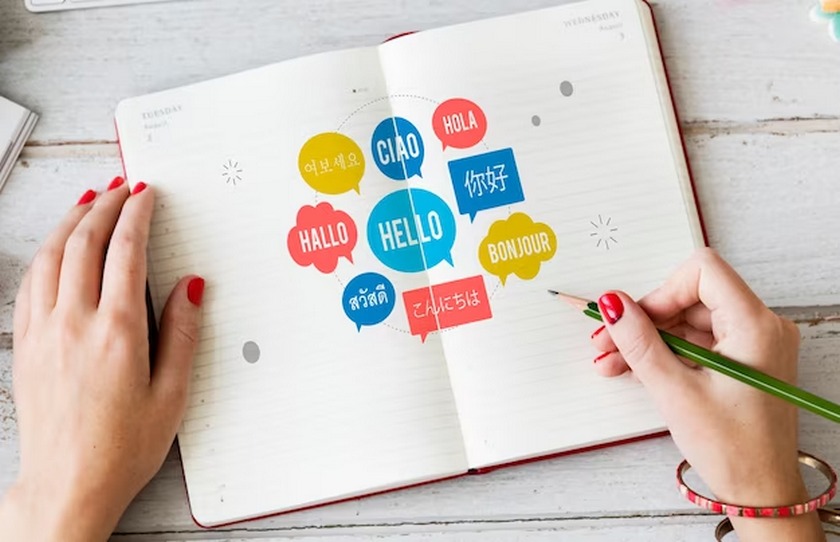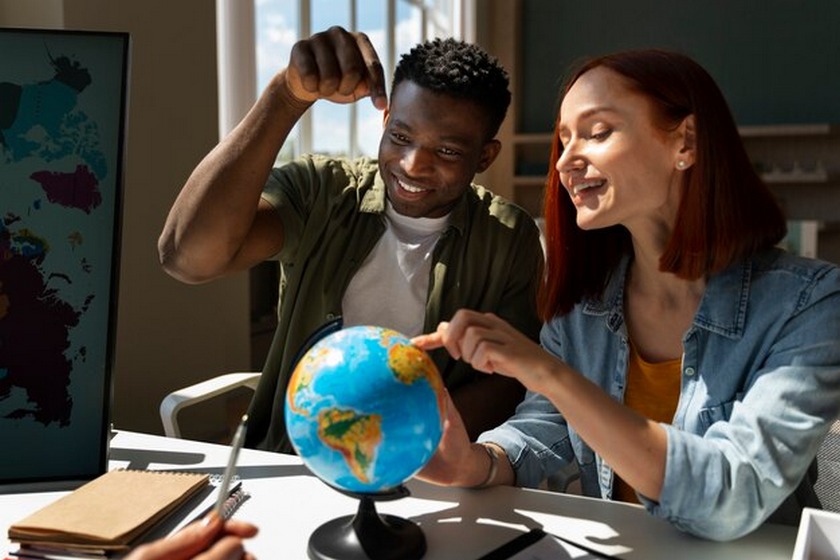Many people are not put off by their lack of knowledge of foreign languages before going. Some individuals feel uneasy and wish to feel confident in an unfamiliar place, especially if they go alone. Many anxieties might overwhelm tourists. They get lost, their bags go missing, and there are troubles with renting a hotel. Making a purchase in a store or ordering meals in a cafe is routine.
How to Overcome Language Barriers While Travelling
If you want to limit the movement map to places where you will be understood for sure, you will not go far. It will be difficult for an American to understand even a native of Glasgow, let alone incomprehensible road signs in Asia. According to a report by the U.S. Census Bureau, even though the number of Americans speaking languages other than English has more than doubled over the past three decades, it still stands at only 20%. Compare this data with that of the European Union. According to statistics, 56% of residents of EU countries speak more than one language, and 28%, in addition to their native language, speak at least two languages. Do not be afraid to travel if you do not speak English or another language. Even in a nation where no one speaks or understands your language, the language barrier may be readily overcome. Let us find out how to adapt to it.
#1. Preparing for the trip
First of all, it is necessary to prepare for the trip: to find out what language is spoken in a particular country and, in theory, to get acquainted with the culture and traditions of its residents. It would be useful to buy a phrasebook and learn a few basic phrases: greeting, farewell, and asking questions to the hotelier and waiters, which will be useful in the hotel. If the country is exotic but at the same time has a developed tourism business, an excellent way out would be to study the same phrases in English, since this language is used by service personnel in most popular tourist destinations. A pocket phrasebook can help with self-guided tours, hiking, and car trips. Do not forget to explore cellular mobile phone eSIM data plans from Yesim.app. Having a virtual SIM card on your smartphone will help you get an unstoppable Internet connection so that you can quickly use online phrasebooks and vocabularies.
To have a GPS or a map with you (there are no problems with navigation tools now; it is not the 16th century after all), you can download the map to your phone or tablet. With eSIM, you can have no worries about it, as you can always use online navigators. Make up a route and find out the number of buses, trains, and their departure times (there will already be names of attractions on the route, it is enough to tell them to the driver or passer-by to get an eloquent answer). For yourself, on a piece of paper or the same phone, you can score the main words in the language spoken in the country where you are going. In particular, these are numbers–– spelling and pronunciation (not all languages use Arabic numerals)––and small phrases like "yes", "no", "how much does it cost?", "how to get through?" etc., depending on your basic needs.
To have a GPS or a map with you (there are no problems with navigation tools now; it is not the 16th century after all), you can download the map to your phone or tablet. With eSIM, you can have no worries about it, as you can always use online navigators. Make up a route and find out the number of buses, trains, and their departure times (there will already be names of attractions on the route, it is enough to tell them to the driver or passer-by to get an eloquent answer). For yourself, on a piece of paper or the same phone, you can score the main words in the language spoken in the country where you are going. In particular, these are numbers–– spelling and pronunciation (not all languages use Arabic numerals)––and small phrases like "yes", "no", "how much does it cost?", "how to get through?" etc., depending on your basic needs.
#2. New technologies at the service of travellers
A traveller who owns contemporary electronics such as a smartphone or tablet would feel like a fish out of water in any nation. There are several language programs available nowadays that allow you to translate essential words into hundreds of different languages. A SIM card for travel will let you easily use online phrasebooks to swiftly translate words and even paragraphs, as well as supply a large number of ready-made helpful phrases tailored for a variety of circumstances. Ignorance of the language should not impede going throughout the world; rather, travel should be an encouragement to study languages and cultures from various nations. In addition to colloquial speech, there is:
- 'sign language';
- emotions;
- facial expressions;
- a drawing in a notebook.
Having a business card of the hotel or a record of the name of the hotel where you are staying will add confidence to your self-guided tours. It is enough to show it to the taxi driver, and he will take you to the hotel. Also, feel free to speak your language if you do not know the local one. Even if the person you are addressing does not know your native language, perhaps they will hear the name of the hotel and tell you where to go, or something like that. So you do not have to be afraid. If you are choosing where to spend your next vacation or where to go for New Year’s Eve, ignorance of the language should not be a deterrent.
You can also learn English, which is known in many countries around the world by hotel staff and not a few locals. You can watch several well-known films in English; this will allow you to hear live English speech and start getting used to it. Oh and when communicating, definitely try to smile more often. A smile will create a more positive attitude for you and a greater willingness to communicate with your interlocutors. If you partially understand the speech, ask again for a simpler and shorter explanation.
#3. Role-playing games
Before the trip, find a partner, if there is none, and play role-playing games, asking for directions or where the exchange office is located, and the like. If possible, use the phrasebook of the desired language or English in this. If you are not travelling alone on the road, play memorized words. Someone says a word that they remember, and someone has to remember its translation. Or one speaks a word in English, and the other speaks it in the language being studied. Then vice versa, and who will win?
#4. Pay attention to your body language!
It is usually assumed that 93% of communication is non-verbal, so that is good news, right? Of course, it might be challenging when you are in a certain scenario and need to explain something basic but do not have the correct words. Body language varies greatly among cultures, so a little research will go a long way. What is sometimes overlooked is that understanding how to communicate non-verbally (in any culture) is a talent in and of itself. It is always worthwhile to attempt to communicate if you feel like it, because surprising yourself with your talents may be empowering. You can do it a thousand times if you can do it once!
#5. Take notes!
Another approach is to have a few pre-prepared notes if you are worried about a certain circumstance (such as purchasing a bus ticket in a small town with restricted internet or applying for visas). This is one method for reducing anxiety in a very frightening scenario, but it is not as effective for everyday use. Simply scribble down a few essential ideas or the first thing you want to say to increase your confidence. You will rapidly stray from the notes, so do not write down a complete discussion (people are quite adept at doing the unexpected!).
#6. Speak up, even if you feel stupid doing so!
It is better to address the locals in their native language, albeit with mistakes, than to assume that they will understand your language. In the worst case, the interlocutor will just shrug his shoulders, and at best, we will be happy to help you, and maybe you will even make useful acquaintances. Besides, you will never get over your problem if you do not practice. Real interaction with people is the only way to learn how to speak.
#7. Adapt to the culture!
Knowing the local customs can endear you to the residents, no worse than your ability to speak. If you try not to make the typical mistakes of tourists, such as, for example, waiting for lunch at 7 p.m. in Buenos Aires or asking for milk in your afternoon coffee in Italy, it will let people know that you are trying to adapt to the culture, even if you cannot say a word.
#8. Go to the goal, no matter what!
The lack of language skills means that you can only point, nod, giggle, and use sign language to get where you need to go. Of course, this is not the best or most convenient way to travel, but it is better to face the difficulties of language and translation than just sitting at home on the couch.
Wrap Up: How to Overcome Linguistic Hurdles When Travelling Abroad
Studying a new language may help you think differently, raise your CV, improve your writing style (and possibly your vocabulary!), improve your memory, meet new people, and come home feeling extremely cool and eager to educate your friends and family.
Regardless of your preference, remember that each technique provides a unique way to interact with sights, cultures, and people all around the world!














